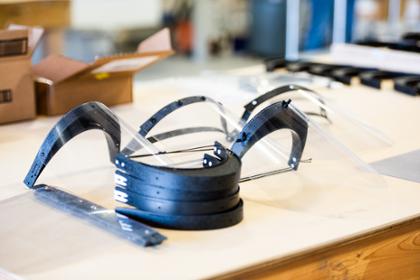Collaboration moves vision to reality to aid in COVID-19 fight
Thursday, April 9, 2020 12:00 PM
News, Giving Back, Alumni, Science and Technology, People and Society, Milestones
Pittsburg, KS
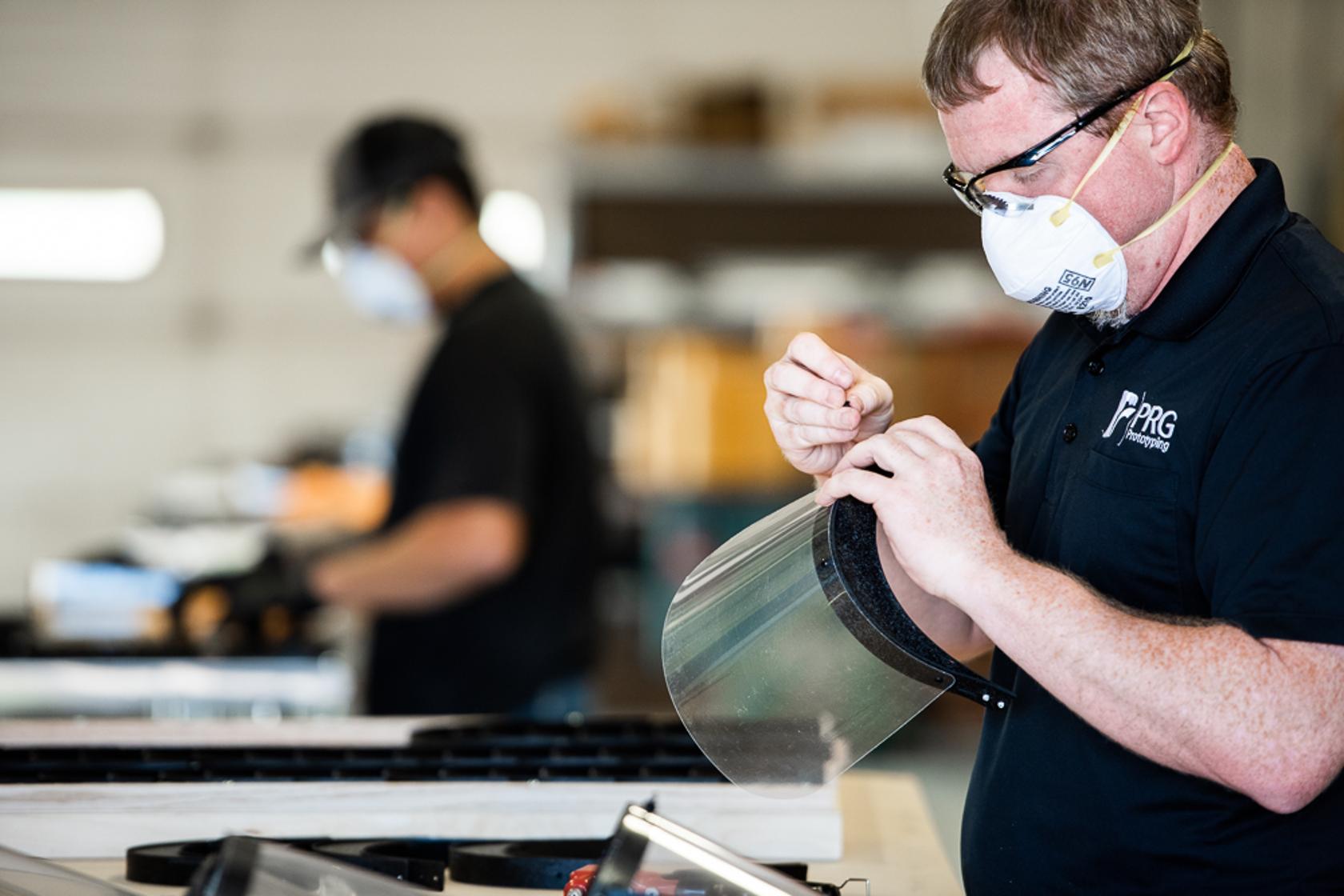
A collaboration between several departments at Pittsburg State University, private local businesses, and the largest not-for-profit healthcare system in the nation has netted the creation and production of face shield components designed to minimize the risk of COVID-19 to thousands of health care workers.
It’s a real-life example of exactly what PSU Chief Strategic Officer Shawn Naccarato envisioned when his division, University Strategic Initiatives, opened Block22 in Downtown Pittsburg last year — a joint project by PSU, a developer, and the City of Pittsburg.
Prior to the pandemic, Naccarato’s team had been putting the finishing touches on a makerspace, naming it The Pitsco Idea Shop after an innovative local partner with a global reach, Pitsco Education. In it, woodworking tools, laser engravers, and 3D printers stood by, ready for use by community members and potential entrepreneurs.
“The core mission is to promote and advance entrepreneurship through innovation,” Naccarato said of the project.
Also prior to the pandemic, faculty and students across town in the university’s Kansas Technology Center and Kansas Polymer Research Center typically were engaged in transformative hands-on projects: they routinely design and build moon rovers that place highly in NASA-sponsored contests; they use industry-grade plastics injection equipment; and they conduct groundbreaking research.
But the campus is quiet now, save for a few essential personnel. Coursework has moved online and students and the bulk of faculty and staff are working from home.
Planting a seed
Last week, several of those faculty, staff, and students, as well as alumni, began collaborating on a face shield project fueled by an idea from Kyle Bockover, branch supervisor of the Ascension Via Christi Hospital Home Medical equipment office in Pittsburg.
“I became aware of 3D printers being used in the race to replenish dwindling supplies,” he said. “A colleague at a medical equipment company in Oklahoma was worried they couldn’t get face shields. I told him I was pretty sure between The Pitsco Idea Shop at Block22 and what PSU has to offer that it could happen. I planted a seed, and it just kind of snowballed from there.”
Ascension Via Christi Hospital Pittsburg CEO Randy Cason and Via Christi Foundation Director David Alexander approved of the project moving forward. Naccarato got to work immediately mobilizing forces on the university side.
“It’s an incredible collaboration involving numerous individuals willing to give time and expertise,” he said.
The players
Plastics Engineering Technology Professor Paul Herring served as a consultant.
Associate Professor David Miller in Mechanical Engineering Technology determined he could make four nose pieces and frames every 17 hours and got to work with existing equipment. Miller also is collaborating with Mercer University personnel on design adjustments using computer-aided design software.
Engineering Technology Chair Greg Murray and Assistant Professor Byron McKay in Technology Education provided technical support, McKay moved his lab’s 3D printers home to keep them running.
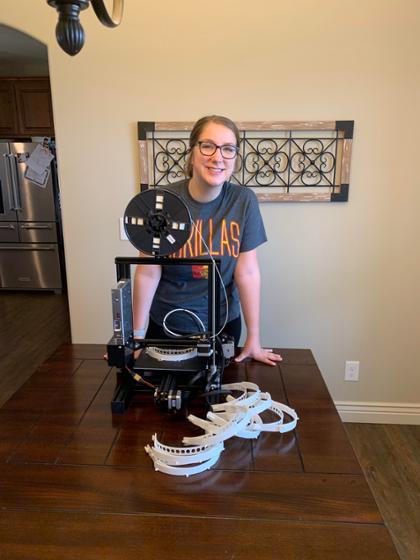
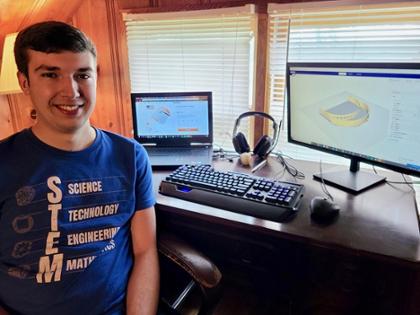
A few of his students — including Lindsey Baker, a senior from Towanda, Kansas, and Devin Elliott, a junior from Riverton, Kansas — signed on to help with their own printers in their homes.
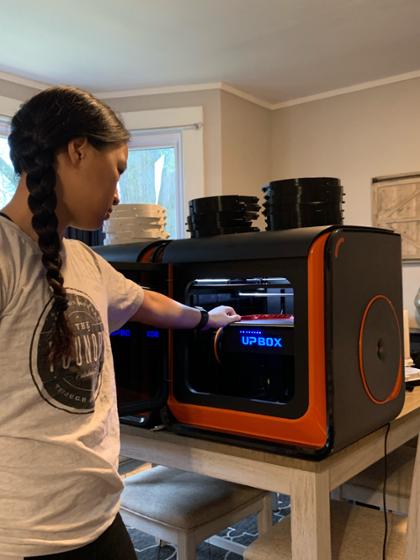
And 2019 graduate Cassandra Ngo, who works at Block22, took home 3D printers from the Pitsco Idea Shop; she monitors them throughout the day and gets up in the middle of the night to start a new print on each printer.
Pitsco, meanwhile, offered to donate filament to local schools who are assisting in the production of the components.
Pittsburg-based DEPCO Enterprises, LLC, and Stratasys, a printer company, donated material to help the effort.
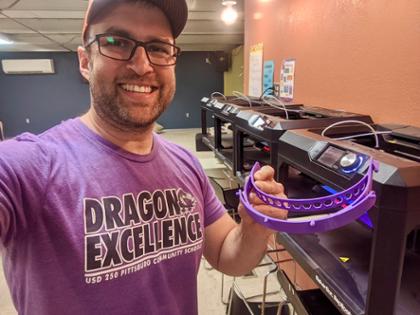
John White, Pittsburg Community Middle School computer applications teacher who graduated from PSU in 2005, moved four of the Pittsburg school district’s 3D printers home to Cherokee so he could produce them during the stay-at-home order.
“They discovered it takes a great deal of time to print just a few, but they’re still valuable and important,” Bockover said.
And PSU alumnus Tyler Harrell, a 2001 graduate of the Plastics Engineering Technology program and founder of PRG Prototyping, based in Pittsburg, got involved. The firm specializes in producing prototypes for plastic, metal, electronics, and textile products. The design team holds degrees in plastics engineering, mechanical engineering, electronics engineering, and industrial design — many of them from PSU.
But business had hit a snag.
"One of the largest companies we did business with had just announced they were temporarily going offline following a statewide stay-at-home order that would make it difficult to continue work,” Harrell said. “I was faced with modifying operations or having to close myself.”
Harrell and his employees quickly began developing a prototype of a face shield they could produce using large water jet and CNC machines and estimated they could turn out 30,000 a month, starting immediately. They could scale up as needed, Harrell said.
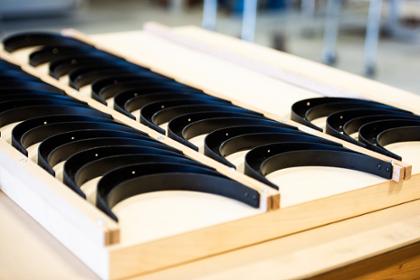
Green light
This week, Ascension Via Christi Pittsburg and Wichita approved the PRG prototype, giving Harrell’s team the green light to get production underway, and purchased 3,500 units. They also connected PRG with the national Ascension Resource Group, which includes 2,600 participants throughout the nation.
A group of Parsons residents purchased 650 to donate to Labette Health. Crossland Construction agreed to purchase 2,000 face shields to donate hospitals in their regional markets. PRG is selling the approved face shields for $4.40 per unit.
“I think we can really help the world right now and stay in business at the same time,” Harrell said. “We're hopeful this could take off and have the real potential for a local business to help address the regional and national gap in PPE supply for front line healthcare professionals.”
Naccarato said it was impressive to see representatives of so many entities so willing and able to quickly collaborate to solve a problem.
“As helpless as we all feel, it’s good to be involved in something that could have a great impact,” he said. “Times of crisis tend to highlight your strengths and weaknesses and the ability to react quickly and in a truly connected way.”
